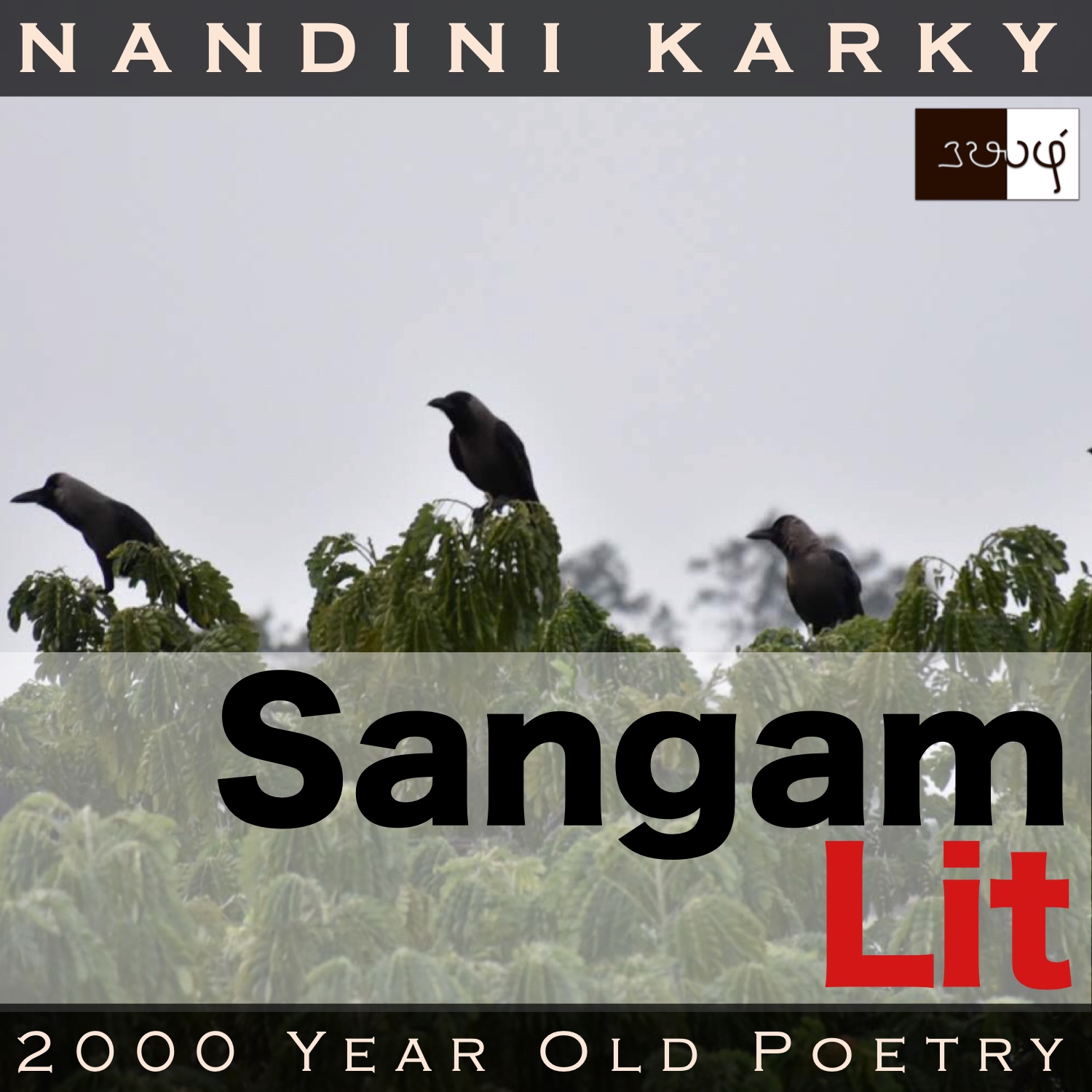Podcast: Play in new window | Download
Subscribe: Apple Podcasts | Spotify | Amazon Music | Android | iHeartRadio | Email | TuneIn | RSS | More

In this episode, we understand the impact of societal pressures on inner life, as portrayed in Sangam Literary work, Natrinai 149, penned by Ulochanaar. The poem is set in the coastal landscape of ‘Neythal’ regions and speaks in the voice of the confidante to the lady, bidding her to elope with the man, considering the troublesome situation in the town.
சிலரும் பலரும் கடைக்கண் நோக்கி,
மூக்கின் உச்சிச் சுட்டு விரல் சேர்த்தி,
மறுகில் பெண்டிர் அம்பல் தூற்ற,
சிறு கோல் வலந்தனள் அன்னை அலைப்ப,
அலந்தனென் வாழி தோழி, கானல்
புது மலர் தீண்டிய பூ நாறு குரூஉச் சுவல்
கடு மா பூண்ட நெடுந்தேர் கடைஇ,
நடுநாள் வரூஉம் இயல் தேர்க் கொண்கனொடு
செலவு அயர்ந்திசினால் யானே,
அலர் சுமந்து ஒழிக, இவ் அழுங்கல் ஊரே.
A curious expression ‘சிலரும் பலரும்’ meaning ‘a few and many’ welcomes us into the verse. The word ‘கடைக்கண்’ talks about the ‘gaze from the corner of the eyes’. Although this word has the romantic connotation of a lover’s shy gaze, we understand it’s a different story here, when we encounter the phrase ‘பெண்டிர் அம்பல் தூற்ற’ meaning ‘women spreading rumours’. The scene then changes to a shot of a ‘speedy horse’ in ‘கடு மா’ and ‘tall chariot in ‘நெடுந்தேர்’. The verse ends in a fiery curse ‘அலர் சுமந்து ஒழிக’ meaning ‘let the slanderers be doomed’, making the inherent anger evident. Let’s listen some more to understand the specifics of this situation.
The man and lady have been in a love relationship for a while. Rumours seem to be spreading around town about them. The confidante, seeing these troubling developments, tells the lady, “Groups of few and many women, looking from the corner of the eyes, placing their index fingers on their noses, gather together on the streets to spread slander. Hearing this, mother came at me with a little, swirling cane. I’m worried because of this, dear friend. May you live long! Brushing against new flowers in the sand, the horse’s thick mane attains a floral fragrance. The lord arrives on a chariot tied with such a speedy horse, in the middle of the night. I have decided that you must elope with him. Let this uproarious town be laden with gossip and perish!” With these words, the confidante reveals the state of affairs at home and decides the best course of action is for the lady to elope with the man. Scholars believe that this rendition could also be the confidante’s way of conveying this situation, to the man listening nearby.
Now, for the nuances of a rustling grapevine in the Sangam era! The confidante opens the scene by bringing to our eyes, groups of women huddled together. Some groups are intimate and small, whereas others are large with more than five or six women, standing around. The confidante paints a vivid portrait of these women by depicting them as looking from the corner of their eyes, in that evergreen representation of gossip! A google search on ‘gossip’ in this twenty-first century too, will render this same image, wherein a group of people are looking at the victim of their rumours from the corner of their eyes. Nothing seems to have changed in more than two thousand years of human nonverbal communication! The next expression she highlights is the touching of one’s nose with the index finger. In current day scientific research, the touching of the nose is interpreted as a sign of judging or deceiving another. When negative emotions are experienced, blood flows through the capillaries in the nose, making us want to scratch it. This scientific explanation, I could seamlessly connect with these Sangam women, engaged in negative talk about our lady. The confidante mentions that such get-togethers and tongue-wagging is happening in the streets and the winds do take them to the ears of mother. Angered by this, mother decides to get to the bottom of things and comes at the confidante, with a cane in hand. A severe portrayal of a Sangam mother, whom we have generally seen to be rather affectionate to her girl!
The confidante, taking into account such disturbing developments, decides on what the lady must do! She mentions the man’s chariot and his speedy horse, with a thick mane that smells of flowers growing along the sands it traverses. Mentioning how he would arrive in the middle of the night in his chariot, even amidst these developments in town, the confidante says the right thing for the lady would be leave town with the man. She implies the man will take the lady on his speedy horse with its flower-smelling mane, away from the stinking rumours of the town. The confidante concludes by declaring that all this town can do is talk and she nudges the lady to be gone, leaving that loud town to ruin themselves with their rumours. In an interesting coincidence, the poem reminded me of a news article I read just a few days ago, talking about a study on ‘Why Girls Run Away to Marry – Adolescent Realities and Socio-legal Responses in India’ and I came away stunned by how some facets of the inner world seem to continue, for millennia together, no matter the developments in the outer one!




Share your thoughts...